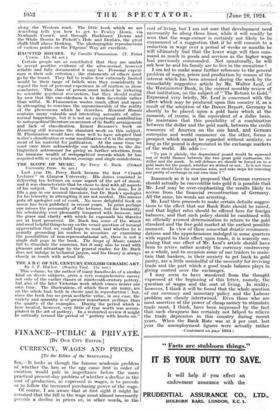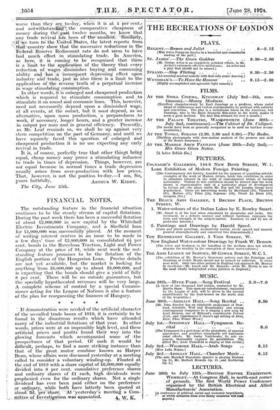FINANCE—PUBLIC & PRIVATE. IBY OUlt crry EDITOR.] -
CURREN-CZ WAGES AND PRICES.
.[To -the Editor of the SPECTATOR.] SIR,—It looks as though the famous academic problem of :whether the hen or the egg came first in order of • creation would pale in importance before the more practical present-day problem of whether a decline in the cost of production, as expressed in wages, is to precede or to follow the -increased purchasing power of the- wage. Of. course, I.am aware that at first sight it might be assumed that the fall in the wage must almost necessarily precede a decline in prices or, in other words, in the cost of living, but I am not sure that development need necessarily be along those lines, while it will readily be seen that the wage-earner is certainly not likely to be enamoured of a suggestion that if he will consent to a reduction in wage over a period of weeks or .months he will ultimately find that the lower wage will then com- mand as much in goods and services as the higher wage had previously commanded. Not unnaturally, he will ask how he and his family are to live in the meantime ! I am kd to make some further reference to the general problem of wage's, prices and profttion by reason of the interest Which has been aroused during the week by the remarkably suggestive article by Mr. Walter Leaf, of the WestminsteF13ank, 'in the current monthly review cif that institution, on the subject of "-The Return to Gold." ressed .very briefly, Mr. Leaf js concerned with the effect which may be produced upon this country if, as a result of the' doption of the Dawes Report, Germany is shortly to be placed upon a gold basis which at the moment, of Course, is the equivalent of a dollar basis. He maintains that ihis possibility of a combination between the dollar and the gold mark, between the credit resources a Ainerica on the one hand, and German enterprise and world commerce on the other, forms a prospect which cannot be regarded without anxiety, so long as_ the pound is depreciated in the exchange markets of the world. He adds :- " To put it plainly, the depreciated pound would be squeezed 'out of world finance between the two great gold currencies, the dollar and the mark. In self-defence we should be forced on to a gold basis for the pound, whether we wished or not. Is it not time that we should face the situation soon, and take steps for restoring our parity of exchange in our own time ? "
Inasmuch as it is not proposed that German currency should actually be convertible into gold it is possible that Mr. Leaf may be over-emphasizing the results likely to accrue from the financial reconstruction of Germany. All the same, his words are arresting.
Mr. Leaf then proceeds to make certain definite sugges- tions to the effect that our Bank Rate should be raised, and that higher rates should be offered here for foreign balances, and that such policy should be combined with an officially avowed determination to return to the gold standard and the free gold market at the earliest possible moment. In view of these somewhat drastic recommen- dations and the apprehensions indulged in some quarters with regard to their effect upon trade, it is scarcely sur- prising that one effect of Mr. Leaf's article should have been to revive rather acutely the currency controversy as a whole, and to occasion some of our traders to main- tain that bankers, in their anxiety to get back to gold parity, are- a little unmindful of the necessity for reviving trade and the part which a good trade balance plays in giving control over the exchanges.
I may seem to have wandered from the thought expressed at the beginning of this letter, namely, the -question of--wages - and -the cost of living. In reality, however, I think it will be found that the whole question of our currency and monetary -policy and the Labour problem are closely intertwined. -Even those who are most assertive of the power of cheap 'money-to 'stimulate trade must, I think, have been impressed by the fact that such cheapness has certainly not helped to relieve the trade depression in this country during -recent years. When the Bank Rate was at 3 per cent. last year the unemployment figures were actually rather Continuea on page 1054 ) worse than they are _ to-day, when it is at 4 per cent.' and notwithstanding the comparative cheapness of money during the ,paSt twelve months, we know that any trade revival has . been OFtli&-'siiralleit:
if we turn to the EniterStates, the latest reports from
4, that country show that the successive reductions' in the Federal- Reserve Rediscount rate do not seem to hive had much effect in stimulating trade. In America, as here, it is coming to be recognized that there is a limit .to the application.. of the theory that every reduction of wages diminishes buying and consuming ability aka has -a 'iionsequent depresSing effect upon ' industry and- trade, just as -'also there is a limit to the application of :the_ reverse truth of a perpetual increase in wage stimulating" conSimi ption. In other words, it enlarged and cheapened production which is required to stimulate consumption and to Stimulate it on sound and economic lines.' This, howe41r, need not necessarily depend upon a diminished wage, at all events,‘ at the outset, but it must depend; as 'an alternative, upon mass production, a preparedness -to work, if necessary, longer hours, and a greater increase in output per man- and in general efficiency. -Presently, as Mr. Leaf reminds us, we shall be up against very stern competition on the part. of Germany, and until we have squarely faced this question of enlarged and cheapened. production it is, no use expecting any early revival in trade.
It is, of course, perfectly true that other things being equal, cheap money may prove a stimulating influence to trade in times of depression. Things, however, are not equal because in normal times a trade depression usually arises from over-production with low prices. That, however, is not the position to-day.—I am, Sir,















































 Previous page
Previous page